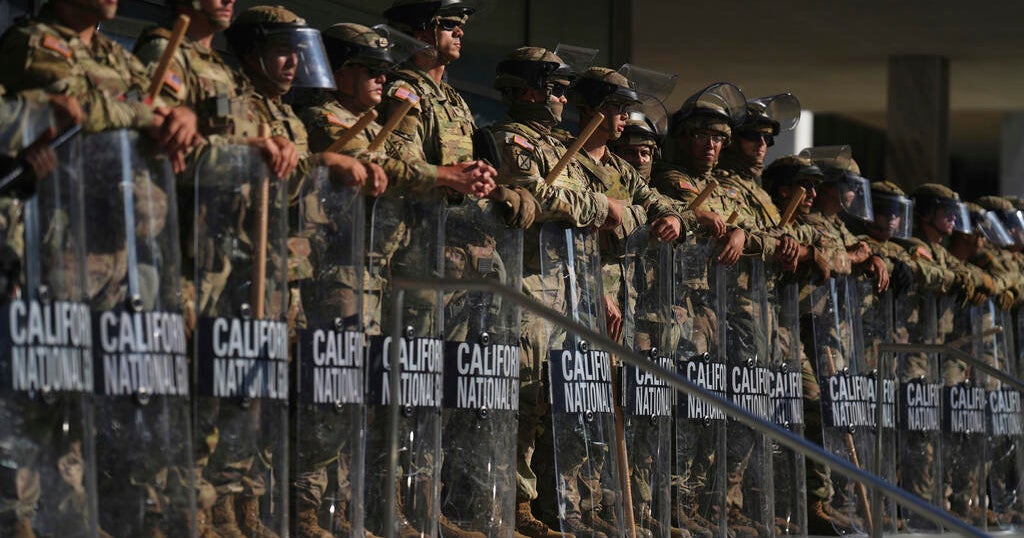In a high-stakes courtroom in California, the legal battle intensified over President Donald Trump’s contentious decision to deploy thousands of National Guard troops and U.S. Marines into Los Angeles. This deployment, which took place during widespread protests against Immigration and Customs Enforcement operations, has led to severe criticism and anxiety among civilians and political leaders alike. The decision triggered a legal challenge spearheaded by Governor Gavin Newsom, escalating to a bench trial that critically examines legality and authority in use of armed forces in civil spheres.
Meghan Strong, representing the state of California, presented her case with vehemence. She argued that President Trump’s action of establishing what she termed a “standing army” in the city was an egregious overreach and unprecedented. She posited the scenario as a disturbing breach of traditionally held principles that discourage military involvement in civil matters. Stating the deployment smacks of arbitrary decision-making by Trump and Secretary of Defense Pete Hegseth, Strong voiced profound concerns over the erosion of civil liberties and the propagation of fear among the residents.
Governor Newsom, aligned with Strong’s argument, had labeled the federal maneuver as an illegal “power grab” that neither sought nor received state approval. At the heart of this trial is the imperative question of whether this deployment infringes upon the Posse Comitatus Act—a foundational federal statute passed in 1878 that restricts the use of military forces in domestic law enforcement activities.
California’s legal team, expressing fears of military overreach, highlighted specific instances where troops set up roadblocks, confined civilian movements, and even partook in the detention of civilians. These actions, according to Strong, starkly illustrate a violation of the Posse Comitatus Act. With these arguments, California sought an injunction that would restrain military presence to merely safeguarding federal properties like courthouses and ICE facilities while pulling back from any active role in law enforcement, especially in immigration enforcement operations deemed by state representatives as an “unlawful military crusade.”
On the contrary, Eric Hamilton, representing the Justice Department, argued that the military’s role was squarely focused on protecting federal assets and personnel and thus did not transgress the Posse Comitatus Act. Hamilton’s reassurances rested heavily on the testimony of Maj. Gen. Scott Sherman, former commanding general of the National Guard task force in Los Angeles. Sherman testified that their operations were in alignment with federal directives and were not characterized by law enforcement activities. He emphasized the professional and serious attitude of the military personnel under his command.
A significant pivot in the trial was President Trump’s justification of the troop deployment under Title 10, a federal law that permits the deployment of National Guard forces during events described as “rebellions” or in circumstances where regular forces cannot sufficiently execute U.S. laws. In an early June memo, Trump explicitly termed the protests in Los Angeles as a form of rebellion posing threats to federal agents. Although Judge Charles Breyer had previously ruled the application of Title 10 as unlawful by Trump, this decision was overturned by an appellate court granting the president discretionary powers in such matters.
However, as the debate progressed, discussions emerged about an alleged “constitutional exception” to the Posse Comitatus Act, which Sherman mentioned during his testimony. This led to an intense exchange with Judge Breyer, who questioned the legal bases of such an exception. Despite Sherman’s assertion that he was merely following directives which claimed a constitutional basis for their actions, the judge remained skeptical about the legitimate existence of any such exception that would circumvent established laws.
As the argument unfolded, California’s attorney, Strong, seized on the apparent confusion and contested the notion of a so-called “constitutional exception” ardently. She argued that neither the president nor the Secretary of Defense had the authority to craft an exception to a federal statute as crucial as the Posse Comitatus Act. This assertion positioned the trial into a broader debate on executive power and its limits, especially concerning military deployment on American soil.
Adding another layer to this complex legal scenario, the controversy surrounding the deployment of the National Guard not just in Los Angeles but similar moves in Washington, D.C., underscored a potentially growing trend. This sparked further apprehensions about the potential for such operations to be replicated in other cities as implied by recent statements from President Trump, regarding potential deployments in places like Oakland and New York.
This trial raises profound questions about civil-military relations, the scope of presidential power under Title 10 and other related statutes, and the implications of military deployment for civil liberties and governance. As the trial moves toward its conclusion, all eyes are on the forthcoming judgments which could have significant repercussions on the delicate balance between national security and individual freedoms, and perhaps redefine the boundaries of executive authority in emergency management and civil governance.









